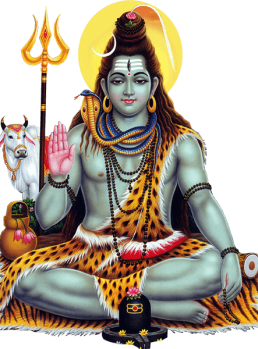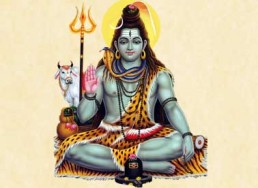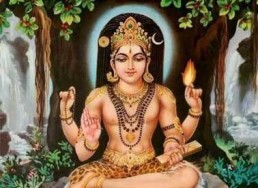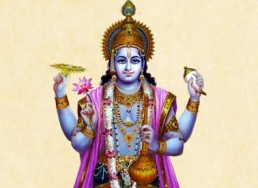Shiva Tandava Stotram
Shiva Tandava Stotram
The Shiva Tandava Stotram is a deeply powerful and rhythmic hymn that glorifies Lord Shiva’s cosmic dance, known as the Tāṇḍava. It is traditionally attributed to Ravana, the demon king of Lanka, who was a great devotee of Lord Shiva.
More information on the Shiva Tandava Stotram can be found at the end of this page.
गलेवलम्ब्य लम्बितां भुजङ्गतुङ्गमालिकाम् ।
डमड्डमड्डमड्डमन्निनादवड्डमर्वयं
चकार चण्डताण्डवं तनोतु नः शिवः शिवम् ॥ १ ॥
galēvalambya lambitāṁ bhujaṅgatuṅgamālikām |
ḍamaḍḍamaḍḍamaḍḍamanninādavaḍḍamarvayaṁ
cakāra caṇḍatāṇḍavaṁ tanōtu naḥ śivaḥ śivam || 1 ||
On which hangs the greatest of snake-like a garland,
And his drum incessantly plays damat, damat, damat, damat,
And Shiva is engaged in the very vigorous manly dance,
To bless and shower, prosperity on all of us.
विलोलवीचिवल्लरी विराजमानमूर्धनि ।
धगद्धगद्धगज्ज्वलल्ललाट पट्टपावके
किशोरचन्द्रशेखरे रतिः प्रतिक्षणं मम ॥ २ ॥
vilōlavīcivallarī virājamānamūrdhani |
dhagaddhagaddhagajjvalallalāṭa paṭ-ṭapāvakē
kiśōracandraśēkharē ratiḥ pratikṣaṇaṁ mama || 2 ||
Which makes his head shine with those soft waves,
And his forehead shining like a brilliant fire-daga daga,
And the crescent of moon which is an ornament to his head,
Makes my mind love him each and every second.
स्फुरद्दिगन्त सन्तति प्रमोद मानमानसे ।
कृपाकटाक्षधोरणी निरुद्ध दुर्धरापदि
क्वचिद्दिगम्बरे मनोविनोदमेतु वस्तुनि ॥ ३ ॥
sphuraddiganta santati pramōda mānamānasē |
kr̥pākaṭākṣadhōraṇī niruddha durdharāpadi
kvaciddigambarē manōvinōdamētu vastuni || 3 ||
Whose mind rejoices at her side long glances,
With the stream of merciful look which removes hardships,
Makes my mind take pleasure in him who wears the directions as apparel.
कदम्ब कुङ्कुम द्रव प्रलिप्त दिग्वधूमुखे ।
मदान्ध सिन्धुर स्फुरत्त्वगुत्तरीयमेदुरे
मनो विनोदमद्भुतं बिभर्तु भूतभर्तरि ॥ ४ ॥
kadamba kuṅkuma drava pralipta digvadhūmukhē |
madāndha sindhura sphurattvaguttarīyamēdurē
manō vinōdamadbhutaṁ bibhartu bhūtabhartari || 4 ||
Of the serpent entwining his matted locks,
He, who is with his bride whose face is decorated
By the melting of red saffron Kumkum,
And He who wears on his shoulder the hide
Of the elephant which was blind with ferociousness,
Makes my mind happy and contented,
In him who is the leader of Bhoothas*.
* can be taken to mean as souls or mythical beings guarding Kailasa.
प्रसूनधूलि धोरणी विधूसराङ्घ्रि पीठभूः ।
भुजङ्गराजमालया निबद्ध जाटजूटकः
श्रियै चिराय जायतां चकोरबन्धु शेखरः ॥ ५ ॥
prasūnadhūli dhōraṇī vidhūsarāṅghri pīṭhabhūḥ |
bhujaṅgarājamālayā nibaddha jāṭajūṭakaḥ
śriyai cirāya jāyatāṁ cakōrabandhu śēkharaḥ || 5 ||
By the ever flowing flower dust.
Falling the bent head of Indra and other Gods,
And may He, whose matted locks are tied by the king of serpents,
And may he, whose head is decorated
By the crescent moon who a friend of Chakora*
Shower prosperity for ever on me.
* A mythical bird which lives by drinking moon light.
निपीत पञ्चसायकं नमन्निलिम्पनायकम् ।
सुधामयूखलेखया विराजमान शेखरं
महाकपालि सम्पदे शिरोजटालमस्तु नः ॥ ६ ॥
nipīta pañcasāyakaṁ namannilimpanāyakam |
sudhāmayūkhalēkhayā virājamāna śēkharaṁ
mahākapāli sampadē śirōjaṭālamastu naḥ || 6 ||
In his forehead, who burnt the God of love,
May He who is forever being saluted by king of devas,
And may he who has collected
The cool ambrosia like crescent moon on his head,
And may he who wears the collection of skulls,
Bless us to create wealth for us.
-द्धनञ्जयाहुतीकृत प्रचण्ड पञ्चसायके ।
धराधरेन्द्र नन्दिनी कुचाग्र चित्रपत्रक-
-प्रकल्पनैकशिल्पिनि त्रिलोचने रतिर्मम ॥ ७ ॥
-ddhanañjayāhutīkr̥ta pracaṇḍa pañcasāyakē |
dharādharēndra nandinī kucāgra citrapatraka-
-prakalpanaikaśilpini trilōcanē ratirmama || 7 ||
May He who burnt the one with five arrows* as an offering to fire,
May He who is the only one who can write decorative lines,
On the tip of the breasts of the daughter of the mountain,
And May He with three eyes makes mind enjoy in him.
* The God of love
कुहू निशीथिनी तमः प्रबन्ध बद्ध कन्धरः ।
निलिम्प निर्झरीधरस्तनोतु कृत्तिसिन्धुरः
कलानिधान बन्धुरः श्रियं जगद्धुरन्धरः ॥ ८ ॥
kuhū niśīthinī tamaḥ prabandha baddha kandharaḥ |
nilimpa nirjharīdharastanōtu kr̥ttisindhuraḥ
kalānidhāna bandhuraḥ śriyaṁ jagaddhurandharaḥ || 8 ||
As several layers of new clouds,
Packed closely on the night of the new moon.
May He who wears the celestial river on his head,
May He who killed the Gajasura with an elephant head,
May He who is very handsome because of the crescent that he wears,
And may he who carries the entire burden of the world,
Bless us with all sorts of wealth.
-वलम्बि कण्ठ कन्दली रुचि प्रबद्ध कन्धरम् ।
स्मरच्छिदं पुरच्छिदं भवच्छिदं मखच्छिदं
गजच्छिदान्धकच्छिदं तमन्तकच्छिदं भजे ॥ ९ ॥
-valambi kaṇṭha kandalī ruci prabaddha kandharam |
smaracchidaṁ puracchidaṁ bhavacchidaṁ makhacchidaṁ
gajacchidāndhakacchidaṁ tamantakacchidaṁ bhajē || 9 ||
Similar to the well opened blue lotus,
On which all the temples depend for prayer,
And him who destroyed God of love, the three cities,
The worldly problems and yaga destroyers,
And him who destroyed elephant faced Asura and also God of death.,
रसप्रवाह माधुरी विजृम्भणा मधुव्रतम् ।
स्मरान्तकं पुरान्तकं भवान्तकं मखान्तकं
गजान्तकान्धकान्तकं तमन्तकान्तकं भजे ॥ १० ॥
rasapravāha mādhurī vijr̥mbhaṇā madhuvratam |
smarāntakaṁ purāntakaṁ bhavāntakaṁ makhāntakaṁ
gajāntakāndhakāntakaṁ tamantakāntakaṁ bhajē || 10 ||
That flows from the flower bunch of collection of arts of the Goddess,
And him who destroyed God of love, the three cities,
The worldly problems and yaga destroyers,
And him who destroyed elephant faced Asura and also God of death.
-द्विनिर्गमत् क्रमस्फुरत् कराल फालहव्यवाट् ।
धिमिद्धिमिद्धिमिध्वनन् मृदङ्ग तुङ्ग मङ्गल-
-ध्वनिक्रम प्रवर्तित प्रचण्ड ताण्डवः शिवः ॥ ११ ॥
-dvinirgamat kramasphurat karāla phālahavyavāṭ |
dhimiddhimiddhimidhvanan mr̥daṅga tuṅga maṅgala-
-dhvanikrama pravartita pracaṇḍa tāṇḍavaḥ śivaḥ || 11 ||
Which is increased by the breath of the snake wandering in the sky,
And to Him who dances to the changing tunes and fierce sound,
Of Dhimi, dhimi, dhimi coming out the auspicious drum.
-र्गरिष्ठ रत्नलोष्ठयोः सुहृद्विपक्ष पक्षयोः ।
तृणारविन्द चक्षुषोः प्रजामही महेन्द्रयोः
समप्रवृत्तिकः कदा सदाशिवं भजाम्यहम् ॥ १२ ॥
-rgariṣṭha ratnalōṣṭhayōḥ suhr̥dvipakṣa pakṣayōḥ |
tr̥ṇāravinda cakṣuṣōḥ prajāmahī mahēndrayōḥ
samapravr̥ttikaḥ kadā sadāśivaṁ bhajāmyaham || 12 ||
With a feeling of equanimity towards snake and a garland,
Towards great gems and dirt or friends and enemies,
Or Towards a blade of grass and lotus like eyes,
Or emperor and ordinary men.
विमुक्त दुर्मतिः सदा शिरस्थमञ्जलिं वहन् ।
विलोल लोललोचनो ललामफाललग्नकः
शिवेति मन्त्रमुच्चरन् कदा सुखी भवाम्यहम् ॥ १३ ॥
vimukta durmatiḥ sadā śirasthamañjaliṁ vahan |
vilōla lōlalōcanō lalāmaphālalagnakaḥ
śivēti mantramuccaran kadā sukhī bhavāmyaham || 13 ||
Sitting near a hollow place near the celestial river Ganga,
Releasing all my bad thoughts and with hands clasped above my head,
After releasing all passion for the pretty women with shifting eyes?
पठन् स्मरन् ब्रुवन्नरो विशुद्धिमेति सन्ततम् ।
हरे गुरौ सुभक्तिमाशु याति नान्यथा गतिं
विमोहनं हि देहिनां सुशङ्करस्य चिन्तनम् ॥ १४ ॥
paṭhan smaran bruvannarō viśuddhimēti santatam |
harē gurau subhaktimāśu yāti nānyathā gatiṁ
vimōhanaṁ hi dēhināṁ suśaṅkarasya cintanam || 14 ||
Remembered, or recited daily by man,
Will make him pure, eternal,
And he would get devotion to Shiva leading him to salvation,
For remembering Lord Shiva, is a sure method of removal of detachment.
यः शम्भुपूजनपरं पठति प्रदोषे ।
तस्य स्थिरां रथगजेन्द्र तुरङ्गयुक्तां
लक्ष्मीं सदैव सुमुखीं प्रददाति शम्भुः ॥ १५ ॥
yaḥ śambhupūjanaparaṁ paṭhati pradōṣē |
tasya sthirāṁ rathagajēndra turaṅgayuktāṁ
lakṣmīṁ sadaiva sumukhīṁ pradadāti śambhuḥ || 15 ||
At the end of every worship or,
Reads it after worship of Shiva on the Pradosha day,
Will get the blessing of Lord Shiva, chariots, elephants and horses,
As well as the affectionate sight of the god of wealth.

Description
Shiva Tandava Stotram
The Shiva Tandava Stotram is a deeply powerful and rhythmic hymn that glorifies Lord Shiva’s cosmic dance, known as the Tāṇḍava. It is traditionally attributed to Ravana, the demon king of Lanka, who was a great devotee of Lord Shiva. The stotram vividly describes Shiva’s fierce, energetic, and awe-inspiring dance, which represents the creation, preservation, and destruction of the universe.
The Shiva Tāṇḍava Stotram glorifies the cosmic dance of Lord Shiva, known as the Tāṇḍava, which represents the cycle of creation, preservation, and destruction in the universe. The hymn celebrates Shiva’s dynamic and eternal nature, describing his fierce yet compassionate form in vivid imagery. It highlights his adornments, such as the crescent moon, serpent garlands, ashes smeared on his body, and the sacred Ganga flowing from his matted hair. The verses are a poetic expression of the divine balance between life and death, beauty and ferocity, and power and devotion. The stotram reflects Ravana’s deep reverence and surrender, showcasing the overwhelming power of Shiva’s cosmic dance and his transcendence over the material and spiritual realms.
The Shiva Tāṇḍava Stotram is written in Sanskrit and follows the Shikharini meter, characterized by a fast, rolling rhythm that mirrors the intensity and energy of Shiva’s cosmic dance. Each verse consists of intricately structured syllables, creating a rhythmic cadence that captures the essence of the Tāṇḍava. The hymn’s repetitive patterns and alliterative sounds enhance its musicality, making it both a devotional and aesthetic experience. The fast-paced rhythm reflects the dynamic movements of Shiva’s dance, symbolizing the pulsating rhythm of the cosmos. This structure not only adds to the poetic beauty of the stotram but also evokes a sense of divine energy and spiritual elevation in those who chant or listen to it.
Reciting or listening to the Shiva Tandava Stotram invokes Lord Shiva’s blessings, helps overcome obstacles, and inspires a sense of awe and devotion.
Other Shiva Shlokams
Aksharamalika Shiva Stotram
Also called the Shiva Akshara Mala Stotram, this is a very popular prayer addressed to Lord Shiva. Each verse starts in the order of alphabets in Sanskrit.
Anayasena Maranam
O Lord Shiva, please grant me a peaceful death without pain (Anasayena Maranam), a life without any trouble or dependence on others for my basic needs (Vina Dhainyena Jeevanam) and a life filled with
Ardha Narishvara Stotram
Shri Ardhanareeshwara Stotram was composed by Sri Adi Shankara bhagavatpada. Creator and Creation are One ~ Ardhanarishwara, composite of Shiva and Shakti together in one body.
Bhoothanath Ashtakam
The Bhoothanatha Ashtakam composed by Shri Krishnadasa is a devotional hymn that glorifies Lord Shiva in his form as Bhoothanatha, the Lord of all beings, spirits, and the cosmos.
Bilvashtakam
Composed by Sri Adi Shankaracharya, the famous Bilvashtakam extols the virtues of the Bilva leaf (also spelt Vilva, Bilwa) and Lord Shiva’s love for it. The following com
Bilvashtakam 14 Verses
Note: For the original version of Bilvashtakam please click here. Composed by Sri Adi Shankaracharya,
Chandrashekhara Ashtakam
Chandrashekhara Ashtakam is a divine hymn to praise God Shiva as Chandrasekhara, the lord who is adorned with moon on his head (Chandra – moon, Sekhar – crown) and to seek refuge from untimely death.
Dakshinamurthy Stotram
Shlokams,Sankara,Shiva,Dakshinamurthy
The Dakshinamurti Stotra is a Sanskrit religious hymn to Shiva by Sri Adi Shankaracharya. It explains the metaphysics of the universe in the frame of the tradition of Advaita V
Ishvaro Guru Atmeti
Shlokams,Shiva,Dakshinamurthy,Guru,Sankara
Salutations to Lord Dakshinamurti, who is all-pervasive like space but who appears (as though) divided as Lord, Guru, and the Self.
Kalabhairava Ashtakam
Composed by Sri Adi Shankaracharya. The hymn illustrates the personality of Kala Bhairava of Kashi, the God of Death(kala). Those who study these 8 verses on Kala Bhairava, which are enticing and whic
Karacharana Kritam
O Lord, kindly forgive all the wrong acts and omissions I have committed, whether I committed them knowingly or unknowingly, with my hands, feet, words, ears, eyes, or mind. Glory to you, Mahadeva, wh
Karpura Gauram
Pure white like camphor, an incarnation of compassion, the essence of worldly existence, whose garland is the king of serpents, always dwelling inside the lotus of the heart. I bow to Shiva and Shakti together
Kasi Viswanathashtakam
Composed by Sri Adi Sankaracharya in praise of Lord Shiva. That man who reads this octet with its meaning, which sings the praise of Shiva who is the lord of Varanasi, would get knowledge, wealth, gre
Lingashtakam
The Lingashtakam is one of the most popular Ashtakams(a Stotram with 8 verses) dedicated to Lord Shiva which praises Him in the abstract "Lingam" form.
Maha Shivaratri
Significance of Ganesh Puja, Vinayaka Chavithi or Chathurthi. See how to prepare for Ganesha Pooja, How to perform the Puja with Video instructions and enjoy Audio devotional songs, uninterrupted and without ads.
Mantra Pushpam
The Mantra Pushpam (literally translating to "Flower of Mantras") is a collection of sacred verses from the 10th chapter of Taittiriya Aranyaka of Krishna Yajur Veda. Each verse begins with an exploration of the relationship between the flower of…
Margabandhu Stotram
This great Stotra Rathna was written by Appayya Deekshitha(1520-1593). He was one of the great interpreter of Advaitha Sidhantha after Adi Sankara. This stotra is written in praise of the Lord Margaba
Mauna Vyakhya
Shlokams,Sankara,Shiva,Dakshinamurthy
I salute Sri Dakshinamurti, who is not subject to time, who makes known the truth of Brahman through the implied meaning of words, who is surrounded by disciples who are themselves Rishis and committe
Mruthyunjayaya Rudraya
Salutation to you Mrithyunjaya, Rudra, Nilakanta, Shambhu & the lord of immortals and this great lord of all beings.
Namaste astu bhagavan
Morning prayer. From Devi Mahatmyam. The Devi Mahatmyam is a Hindu religious text describing the Goddess as the supreme power and creator of the universe. It is part of the Markandeya Purana, and esti
Nidhaye Sarvavidyanam
Shlokams,Sankara,Shiva,Dakshinamurthy
Salutations to Sri Dakshinamurti, the reservoir of knowledge (the abode of all learning), the healer of all those who suffer from the disease of samsāra, and the teacher of the whole world.
Om Namah Pranavarthaya
Shlokams,Sankara,Shiva,Dakshinamurthy
Om. Salutation to the one who is the meaning of praņava, who is in the form of pure knowledge, who is taintless and who is free from any change. To that Sri Dakshinamurti, (my) salutations.
Om Namo Bhagavate Dakshinamurthaye
Shlokams,Sankara,Shiva,Dakshinamurthy
Om. Salutations to Bhagavan Dakshinamurti. (Oh Lord) Bless me with memory, the capacity to think properly, and clarity, wisdom.
Rudram Chamakam
The Chamakam portion of the Sri Rudram is a profound and structured Vedic prayer that follows the Namakam, extending the worship of Lord Rudra (Shiva) by asking for blessings and the fulfillment of various needs. Unlike the Namakam, which focuses on…
Rudram Chamakam Meaning
The Chamakam portion of the Sri Rudram is a profound and structured Vedic prayer that follows the Namakam, extending the worship of Lord Rudra (Shiva) by asking for blessings and the fulfillment of various needs. Unlike the Namakam, which focuses on…
Rudram Laghunyasam
Laghunyasam is a preliminary Vedic chant traditionally recited before performing the Sri Rudram to purify and align the body, mind, and spirit with divine energy. The term "Nyasam" refers to a process of mentally assigning or dedicating various…
Rudram Laghunyasam Meaning
Laghunyasam is a preliminary Vedic chant traditionally recited before performing the Sri Rudram to purify and align the body, mind, and spirit with divine energy. The term "Nyasam" refers to a process of mentally assigning or dedicating various…
Rudram Namakam
The Namakam portion of the Sri Rudram, also known as the Rudra Prashna, is a profound and intricate Vedic hymn found in the Krishna Yajurveda, specifically within the Taittiriya Samhita (Book 4, Chapter 5). The term Namakam is derived from the…
Rudram Namakam Meaning
The Chamakam portion of the Sri Rudram is a profound and structured Vedic prayer that follows the Namakam, extending the worship of Lord Rudra (Shiva) by asking for blessings and the fulfillment of various needs. Unlike the Namakam, which focuses on…
Rudrashtakam
The famous Rudrashtakam extols the many qualities of Shiva. This is composed by Sri Goswami Tulsidas. Rudra is considered as the fearsome manifestation of Shiva. Rudrashtakam has its origins in the Ra
Shambu Devam Sakalajagatam
I sing in praise of God Shambhu, the Lord of all worlds, and the three-eyed one; the consort of Gauri, the grantor of happiness, blessings and gifts, the one with the moon as his crest-jewel.
Shambu Stuti
A stuti on lord Shiva composed by lord Rama himself. Lord Rama recites this at Rameshwaram when faced with the near impossibility of crossing the vast ocean to reach Lanka, he prayed intensly to Lord
Shiva Aparadha Kshamapana Stotram
The Śiva Aparādha Kṣamāpaṇa Stotram, or "Hymn of Forgiveness for Offenses to Lord Śiva," is a heartfelt composition by the revered philosopher and saint Śrī Ādi Śaṅkarācārya. T
Shiva Ashtakam
Composed by Adi Shankaracharya. This ashtakam is a descriptive salutation of the different attributes of Shiva. The great yogi who is referred to as Ardhanarishwara (the one who has included the femin
Shiva Mahimna Stotram
The Shiva Mahimna Stotra is very popular among the devotees of Lord Shiva and is considered one of the best among all Stotras (or Stutis) offered to Lord Shiva. The legend abou
Shiva Mahimna Stotram Meaning
The Shiva Mahimna Stotra is very popular among the devotees of Lord Shiva and is considered one of the best among all Stotras (or Stutis) offered to Lord Shiva. The legend abou
Shiva Manasa Puja
Sri Adi Shankaracharya composed this mantra for lord Shiva. Using this stotra, we can perform mental worship of Lord Shiva.
Shiva Panchakshara Stotram
The famous Shiva Panchakshara Stotram praises Shiva and the power of the five sacred syllables, na-ma-shi-va-ya.
Shiva Pratah Smaranam
This is a short and beautiful 'Three Shloka Prayer' that makes the start of the day full of energy and happiness. Composed by Sri Adi Shankaracharya.
Shiva Sahasranama Stotram
Also called the Shiva Akshara Mala Stotram, this is a very popular prayer addressed to Lord Shiva. Each verse starts in the order of alphabets in Sanskrit.
Shiva Shadakshara Stotram
In this Hexa-Syllabic Hymn, there is a single stanza mantra for each letter of Aum-Na-Ma-Shi-Va-Ya. This mantra is found in Rudrayamala Tantra text.
Tatpurushaya Vidmahe Rudra Gayatri Mantra
Om. May we know that Lord Isvara, for which may we meditate upon Mahadeva. May that Rudra impel us (towards him).
Tryambakam Yajamahe
We worship Lord Shiva the three-eyed one, the one who is the master of all senses and qualities and the one who is the sustainer of all growth. May he release us from the bondage of death, just as a r
Vagarthaviva Sampruktau
Kalidasa prays to the divine parents Paarvathi & Parameshwara who are inseparable like the word and its meaning, in order to guide him in acquiring the power of words and their meanings (literature) as he embarks on the Mahakavya, Raghuvamsa.
Vande Shambu Umapatim
I salute Shambu, Umapati, the preceptor (teacher) of devas, I salute the cause of the earth, I salute the one ornamented with the serpent, the wearer of the moon, I respect that master of all beings.
Vedasara Shiva Stava
Vedasara Shiva Stava: The Essence of Vedic Wisdom The Vedasara Shiva Stava is a beautiful 10-verse hymn written by Adi Shankaracharya in praise of Lord Shiva. The name
Shiva Tandava Stotram – Shiva – In Sanskrit, English Translation, Meaning, Significance and Audio.



